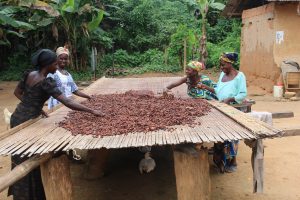Greater progress required on key schemes to lift African cocoa farmers from below poverty line

Edward Akapire (below), head of region, Fairtrade Africa West Africa Network, reflects his observations on the key improvements that need to be made within the cocoa sector that will deliver on the progress being made by farming reforms in Ghana and Ivory Coast

It is 6.00am in Divo in the heart of Côte d’Ivoire in West Africa, one of the largest world cocoa producers. Farmers are getting ready to go to the farm to prune as the harvesting season approaches. After the day’s work, they go back home to their families. They wait with eager anticipation to send the harvested cocoa beans to the local selling agent for the much needed income to feed their families.
In West Africa, in both Ghana and Cote d’Ivoire, a new trend is emerging. Farmer groups are getting more formalised. They are forming cooperatives and strengthening them by approaching their organisations as local businesses that need a profitability and sustainability model. First, the farmers hired a Manager to run the day to day administration of the cooperative and to help them readily get market access.
Then they realised that daily record keeping and farm accounts are not only essential but are vital for running the farm business, so some farmer groups are beginning to adopt this practice, although it is not yet a commonly held process with most farmer organisations. The cooperatives now have a President and a local executive body, who participate in an Annual General Assembly to take very important decisions on how to invest their premium and incoming earnings, how to train and build the capacity of their member farmers in good agricultural practices, and how to lobby the local government for favourable policies and terms of trade.
Within the agricultural sector across in Ghana and Cote d’Ivoire, these two scenarios are becoming a new normal for organisations like Fairtrade certified organisations, gradually moving away from the pristine and traditional forms of farming to one that is more organised, embracing the need for farmer cooperatives and robust management structures.
Good management: strengthening farms and cooperatives as businesses
Despite this new way of approaching agriculture and trade, there is a mix to blend to ensure that trade volumes and bean quality help farmers to cover their production and management cost, whiles at the same time assuring a decent livelihood for their households. Running the farm as business has also helped farmers across Africa realise that sustainable crop production helps builds profitability, not only because it attracts responsible and ethical buyers for their cocoa beans, but also because the good agricultural practices they engage in help them to protect the environment and increases the yield from the same piece of land. For these farmers and their organisations, organisational governance, which hitherto were not common practices in farming, have today become the back bone of their operations as farm organisations, and that is what they rightly are: farmer cooperatives registered as legal business entities. These organisations are able to create shared value for community by investing their premiums in social infrastructure such as building schools, hospitals, and providing potable water as well as sanitation facilities among others.
A recent monitoring report from Fairtrade Africa’s West Africa Cocoa Programme details information from two years of data collection measuring indicators on organisational strengthening, governance, internal management systems and livelihoods of farmers as initiated by Fairtrade to support some cocoa farmers within its supply chain. The findings from this report, showing some positive progress made in the area of capacity building, skills training and farm organistion. The report details Fairtrade’s response to low farmer incomes. While it may be too early to see significant impact in farmer incomes at the level desired, the findings in the report indicate that strengthening cooperatives is a first step in the right direction: it shows what Fairtrade is doing to help address the issue of low income for farmers.
For Patrice Kangou, Manager of ECAAF Cooperative, being part of this organisational strengthening module of the West Africa Cocoa Programme has brought progress to the cooperative: “We have been able to provide potable water to our community through Fairtrade premiums. Also, through the democratic decision making process, the farmers decided to build a maternity clinic to provide health care to pregnant women in the locality.”

Addressing trade relations and social issues: The nexus between Leadership and Empowerment
Whereas these aforementioned steps are critical, they cannot in themselves bring farmers to required levels of sustenance and decent living, which is their basic human right. There is a need for multilateral stakeholder engagement within the cocoa and commodity sector to protect the rights of vulnerable groups like small holder farmers who produce the majority to the world’s cocoa. Here, the action taken by the governments of Ghana and Côte d’Ivoire to sell cocoa and set prices through the announcement of the Living Income Differential for both countries is highly commendable and a step in the right direction.
The typical farmer may never be at the international trade negotiating table on trade and commodity pricing. This farmer may not be present at high level discussions by local governments on foreign exchange projections from the sales of agricultural produce. This notwithstanding, an informed, and empowered farmers have a better opportunity to voice and articulate their concerns and engage with relevant stakeholders for more support in organisational strengthening, market opportunities and the capacity building of their members through associations and bodies such as the Fair Trade product networks.
This is where organisations like Fairtrade place a lot of importance on developing the Leadership and Management of the Producer Organisations through their Executive members. These executives and other lead farmers are taken through crucial skills trainings such as Financial Management to strengthen their organisations and Negotiating skills to help them better engage with these key stakeholders. In Ghana and Cote d’Ivoire, these product networks engage with relevant organisations such as Conseil Café Cacao and the Ghana Cocoa Board which provide their farmer cooperatives with support.
Farmers and farmer organisations receive training on Leadership and Empowerment training and capacity building not only in the area of good governance, but also these organisations are supported to develop their own 5 year strategic plans. These trainings also focus on important topics such as social compliance (child labour), social inclusion and the empowerment of women. Gender empowerment training programmes are also a good way to empower female members within the cooperative who then take up leadership roles and contribute meaningfully to the organisational development together with their male counterparts. There is a lot to be done to help address some of the socially held norms about the role of women in agricultural and cocoa supply chains. Organisations like Fairtrade are helping to empower women and create more awareness through its programmes like the Women’s School of Leadership.
Despite the progress made so far in empowering farmers, data from report findings show that a majority of farmers in both countries live below the poverty line and are not able to earn a living income.
This means that a lot more may needs to be done to ensure that farmers earn the directly the value worth of the volumes they sell. To achieve this, there is the need to address other bottlenecks within the agricultural supply chain that focus on transparency by all intermediary players, commitment to ethical standards by traders and brands, promoting a favourable regulatory and policy environment by government, advocacy, technical support and technological application by other actors such as private sector, non-governmental organisations, academia and civil society.
As the global economic outlook becomes uncertain with the current pandemic situation of corona virus, the case of empowerment and strengthening of farmer organisations becomes even more critical to ensure a strong local farmer organisation that is run by and for its members and is able to provide member support, food security, balance of trade and continuity of trade agreements by respective governments.
First, farmer groups themselves should be encouraged to form unified networks and associations that help them to stay abreast with current trends on trade pricing, new farming methods, and new market opportunities. This will enable them to better support individual farmers within their cooperatives to be able to take advantage of these opportunities and share best practices.
Second, recognised and ethical labels must continue to add value to member farmer cooperatives by ensuring continued support and capacity building to their members. As recognised labels, such organisations can also provide their technical expertise to support collective industry wide stakeholder action to be able to reach more farmers, especially those that are not under sustainable production certification schemes to address issues of social compliance, environmental sustainability and good agricultural practices.
Third, policy and decision makers should ensure a regulatory framework that continues to support transparency at all levels of the supply chain. This also includes trade terms that put the farmer at the heart of pricing to ensure that farmers are able to earn decent incomes and also contribute to sustainable development for their local economies.
In the end, the farmer will be the better for it. Not only as the individual farmer who is able to cater for the needs for their family, bringing them out of poverty, but the farmer organisations themselves ensure business continuity that enables them to provide support to the individual farmers who form the cooperative.



